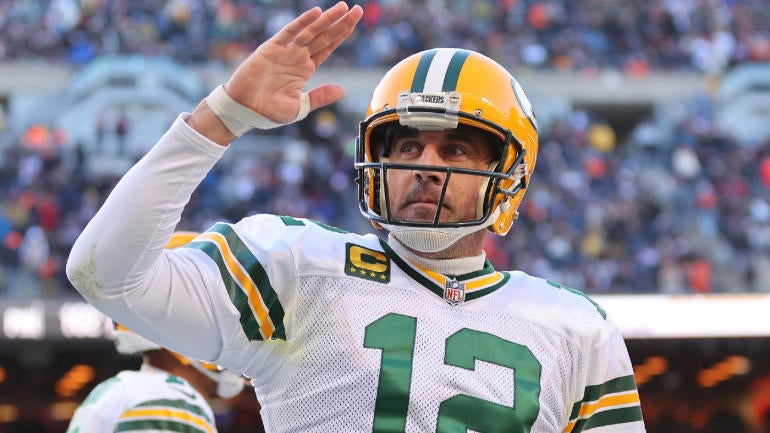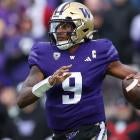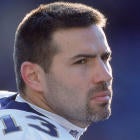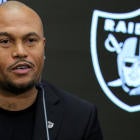
Packers general manager Brian Gutekunst was noncommittal about quarterback Aaron Rodgers returning for the 2023 season when addressing the media on Tuesday at the NFL combine in Indianapolis. He said all options are on the table until he speaks with Rodgers.
"We want what's best for the Green Bay Packers, what's best for Aaron," Gutekunst said. "So we'll get to that once those conversations happen."
Gutekunst revealed that his only communication with Rodgers since a season ending meeting nearly two months ago has been a few text exchanges.
Rodgers went on a darkness retreat originally scheduled to be four days last week to contemplate whether he wants to retire, return to the Packers or seek a trade. He reiterated he wouldn't hold the Packers hostage by dragging out his decision during an interview on the Marcus Aubrey Podcast. Ideally, the Packers will know Rodgers' intentions prior to March 15 when free agency begins.
Conventional wisdom suggests retirement is the least likely option because Rodgers would be walking away from a fully guaranteed $59.465 million. He would also be overshadowed if in the same Hall of Fame class as Tom Brady, who recently retired.
Rodgers' contract
Rodgers became the NFL's first $50 million per year player last March once he decided he wanted to remain with the Packers rather than try to force a trade. The contract is widely considered to be $150.815 million over three years, although there are two additional below-market years (2025 and 2026) in the deal.
The Packers used one of the NFL's more complex contract structures with Rodgers. The deal has the seldom used double option bonus structure.
Initially, Rodgers' 2023 base salary is a fully guaranteed $59.465 million. A $58.3 million payment is required to exercise an option for Rodgers' 2025 contract year worth $20.9 million to drop his 2023 base salary to a fully guaranteed $1.165 million. Rodgers is scheduled to make $59.515 million in 2023. The window to exercise this option is the first day of the 2023 league year (March 15) until a day before Green Bay's first 2023 regular season game in September.

With The First Pick Newsletter
With The First Pick Newsletter
Prepare for the upcoming NFL Draft with the day’s big stories + mock drafts, big board updates and more.
Thanks for signing up!
Keep an eye on your inbox.
Sorry!
There was an error processing your subscription.
From a salary cap standpoint, the presumption is option years will be picked up. Option bonuses are prorated over the life of a contract (up to a maximum of five years), including the option years, beginning in the league year when the option is exercised. This means the $58.3 million option bonus is prorated on the salary cap at $14.575 million annually from 2023 through 2026.
Rodgers is counting on Green Bay's 2023 salary cap at $31,623,570. His cap number consists of $8.16 million in proration from his fully guaranteed $40.8 million 2022 roster bonus, $14.575 million in option bonus proration, the reduced $1.165 million base salary, a $50,000 workout bonus and $7,673,570 of pre-existing bonus proration from previous Packers contracts.
The contract's second option is in 2024. Rodgers has a $49.25 million 2024 base salary that was guaranteed for injury at signing. This $49.25 million becomes fully guaranteed on the fifth day of 2024 waiver period (five days after Super Bowl LVIII) on next Feb. 16. A $47 million payment is required to exercise an option for Rodgers' 2026 contract year worth $15.05 million to drop his 2024 base salary to a fully guaranteed $2.25 million. The window to exercise this option is the first day of the 2024 league year until a day before Green Bay's first 2024 regular season game.
The $47 million is currently being prorated on the cap at $15,666,666, $15,666,666 and $15,666,668 for 2024, 2025 and 2026 because of the presumption that options will be exercised. Rodgers' 2024, 2025 and 2026 cap numbers are listed as $40,701,666, $59,301,666 and $53,451,668.
Trade timing
The optimal time for the Packers to trade Rodgers salary cap wise is after June 1. By waiting until June 2, the bonus proration from Rodgers' 2024 through 2026 contract years wouldn't accelerate onto Green Bay's 2023 salary cap. It would be a 2024 cap charge.
The Packers would free up $15.79 million of cap space. There would be $15,833,570 in dead money, a salary cap charge for a player no longer on a team's roster, from the bonus proration relating to Rodgers' 2023 contract year. There would be $24.48 million of dead money in 2024 from the 2024 through 2026 bonus proration.
The acquiring team will want a much earlier timetable for a trade so Rodgers can have as much time as possible to get acclimated to a new offense and develop chemistry with his wide receivers. Trades for a starting quarterback typically occur before the NFL draft, which is April 27 through 29 this year.
With a trade before the draft, Green Bay's salary cap charges for Rodgers will increase by $8.69 million. There would be $40,313,570 in dead money composed of $32.640 million in roster bonus proration and the $7,673,570 of 2023 bonus proration that already existed before Rodgers' new deal. He would be off Green Bay's books beginning in 2025.
Older quarterback trade compensation
Only a handful of starting quarterbacks who were at least 35 years old have been traded since the current NFL system of free agency was implemented in 1993.
The most obvious comparison is to Brett Favre, who preceded Rodgers as Green Bay's starting quarterback. The Packers dealt Favre, who was 38, to the Jets for a conditional 2009 fourth round pick in August 2008 after he changed his mind on retiring. The Packers ended up with a 2009 third round pick because Favre's offensive playtime during the 2008 season hit the 50% mark; 70% or more playtime with the Jets making the playoffs would have garnered a second round pick instead. The maximum return for Green Bay would have been a first round pick with Favre's playtime reaching 80% and the Jets making the Super Bowl.
A poison pill was also included. If Favre was subsequently traded to the Vikings (an NFC North rival), the Jets would have been required to give the Packers three first round picks. Favre only played one season with the Jets. After he retired again following the 2008 season, the Jets relinquished rights to him by releasing him. This paved the way for Favre to have another change of heart and play his final two NFL seasons with the Vikings.
The most accomplished older quarterback to be traded is Joe Montana. The 49ers dealt Montana, who was 36, safety David Whitmore and a 1994 third round pick to the Chiefs for a 1993 first round pick (18th overall) in April 1993. Montana spent 1992 backing up Steve Young after missing the entire 1991 season because of an elbow injury.
The 49ers' initially asked for first, second and third round picks in the trade. Montana retired after two seasons with the Chiefs.
Warren Moon, at age 37, was traded from the Oilers (now Titans) to the Vikings in April 1994 for a 1994 fourth round pick and a 1995 third round pick. The Hall of Famer played three seasons for the Vikings.
The latest older quarterback data point is Matt Ryan. The Colts acquired a soon-to-be 37 year old Ryan from the Falcons last March for a 2022 third round pick. Ryan decided a fresh start was best after 14 years in Atlanta because the Falcons tried to replace him in a failed pursuit of Deshaun Watson. The Colts are expected to release Ryan before the 2023 league year starts on March 15 because of his poor play last season.
Rodgers' trade value
The 39-year-old Rodgers making his career a year-to-year proposition and his contract complicate a trade. These two factors and Rodgers' age will impact the trade compensation.
According to NBC Sports' Peter King, the Packers will seek two first round picks for Rodgers in the event of a trade. The Packers probably needed to deal Rodgers last year when he coming off back-to-back NFL MVP awards to expect that type of return or more.
Rodgers had a subpar 2022 season. His 12 interceptions were his most since 2008, when he first became a starter. Rodgers threw 13 interceptions combined over the 2019 through 2021 seasons. His 91.1 passer rating was the lowest in his career. Rodgers' 217.4 passing yards per game were also a career low.
There were some mitigating factors. Rodgers played through a fractured thumb on his throwing hand for a majority of the season and dealt with a rib injury during the latter part of the season. Growing pains existed with rookie wide receivers while adjusting to the departure of Davante Adams, his favorite target, in a trade to the Raiders.
Nonetheless, Rodgers' trade value should be more than the other older quarterbacks. Rodgers is probably better than some of his 2022 statistics suggests, but not quite the player from his most recent MVP seasons.
The low end of Rodgers' trade value should be a 2023 second round pick, assuming he is dealt in a timely fashion. The high end would be a 2023 first round pick with a conditional 2024 second round pick that could become a first round pick depending on either Rodgers or the team's 2023 performance and whether he commits to play in 2024.
A team should want some assurances from Rodgers about playing at least two seasons before giving up significant assets to obtain him. Otherwise, he's just a very expensive one year rental for $59.515 million.
Gutekunst raised some eyebrows with his comments to the media about backup quarterback Jordan Love.
"We're excited about him," Gutekunst said of Love. "I think I've expressed to a lot of people that he needs to play. That's the next step in his progression. He needs to play. Jordan's done a great job working hard, so he's doing everything we're asking.
Gutekunst's statements could be construed by potential suitors that Green Bay is comfortable moving on Rodgers and may not drive the hardest bargain in trade. It also wouldn't be surprising for Green Bay to prefer to deal Rodgers to an AFC team. Reducing the number of trade partners might also impact what Green Bay can get in return for him. Although Rodgers doesn't have a no-trade clause in his contract, the Packers aren't going to trade him some place doesn't want to be.
As a general manager, I would feel comfortable giving up a 2023 second round pick and a conditional 2024 second round pick for Rodgers. The 2024 pick could become a first round pick with Rodgers taking at least 80% of offensive snaps during the regular season and the team winning a wild card playoff game or advancing to the divisional playoff round. I would want a conditional 2025 second round pick in return from the Packers that voids if Rodgers plays a second season for the team in 2024.
Salary cap implications for the acquiring team
The Packers wouldn't exercise the 2023 option regardless of when a trade occurs. Picking up the option before making a trade would add $59.465 million to Green Bay's dead money to bring the total to $99,778,570.
The acquiring team would be assuming the remainder of Rodgers' contract, including the right to exercise the 2023 and 2024 options. Technically, Rodgers would be under contract through 2026 but realistically for two years worth $108.815 million unless the two below market salaries in 2025 and 2026 are adjusted.
The new team would have a $15.79 million 2023 cap hit for Rodgers consisting of the $14.575 million of option proration bonus, his $1.165 million base salary and $50,000 workout bonus. Rodgers' 2024, 2025 and 2026 cap numbers would be $32,541,666, $51,141,166 and $45,291,668.
The option surely would be exercised because Rodgers' 2023 cap charge becomes $59.515 million cap hit if it isn't. A $59.515 million cap number for Rodgers isn't feasible for NFL teams, with the exception of the Bears and Falcons.
The acquiring team would have to contend with $43.725 million of dead money relating to the 2024 through 2026 proration from the $58.3 million option bonus if Rodgers retired in 2024. The dead money increases to $60,483,334 with Rodgers retiring in 2025 because of the $47 million 2024 option bonus payment. The $60,483,334 would consist of $29.15 million in bonus proration for 2025 and 2026 from the first option and $31,333,334 for the 2025 and 2026 bonus proration from the second option.
Final thoughts
Green Bay's best chance to get a king's ransom for Rodgers would be a quarterback-needy team with a playoff-ready defense to think he could be missing piece to being a championship contender. The Jets best fit this bill. Hiring Nathaniel Hackett as offensive coordinator should make the Jets an attractive destination to Rodgers. Hackett was Rodgers' offensive coordinator in Green Bay for three years (2019 through 2021) before he became the Broncos head coach in January 2022. Intervention from owner Woody Johnson could be the perfect storm for the Packers to get the Jets' 2023 first round pick (13th overall), a conditional 2024 second round pick that could become a first round pick as well as additional draft capital and/or a couple of players.





















